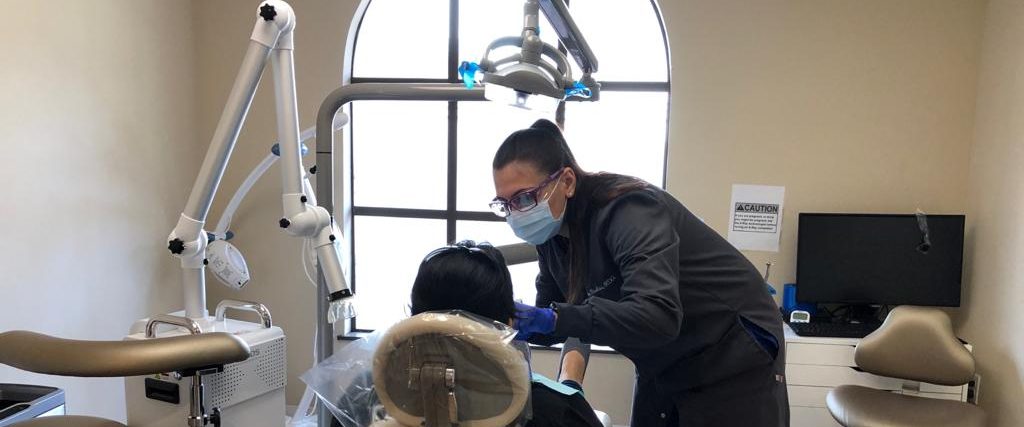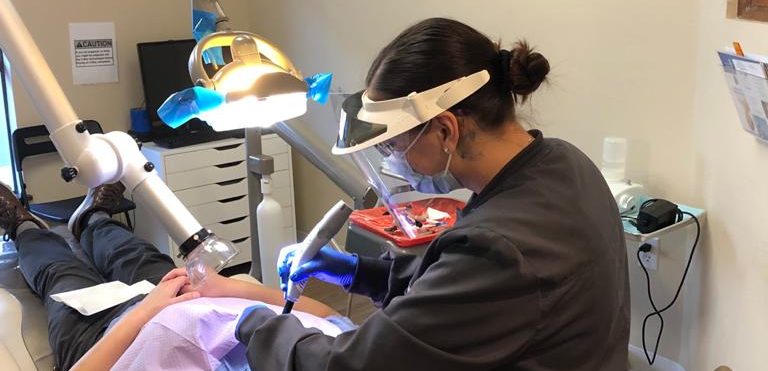Date : 28/05/2020
Cavities in children aren’t a big deal, right? Kids are losing those baby teeth, anyway, so what’s the point in looking for early signs of cavities?
Well, according to your child’s dentist, there’s a big reason you should worry about cavities in any and all teeth. It doesn't matter if those teeth are scheduled to fall out of your child’s mouth or not.
Your oral health and the oral health of your child is directly related to your overall health. And ignoring the early signs of cavities, even in a baby tooth, means you’re ignoring a potential health problem later.
We're sure that's not a price your willing to pay. So, let's get off that train and let Your Caring Dentist Group teach you some important info about cavities and your kids.
TOOTH CAVITIES IN CHILDREN
Cavities in children are common. As a matter of fact, the numbers are staggering.
The National Institute of Dental and Craniofacial Research (NIH) states that nearly 42 percent of children ages 2 to 11 have either full-blown cavities or tooth decay in their mouths.
That’s nearly half of all children.
And that doesn't even include the millions of families who can't afford to pay for dental care or choose not to bother.
That means nearly half of all children suffer a higher risk of life-threatening health problems in adulthood simply because they're not receiving the oral health care they need.
Do not ignore those baby teeth
Yes, those teeth are falling out of your children’s mouths, but cavities aren’t just about rotten or unsightly teeth. That's something many people forget.
Cavities can become dangerous.
As the decay becomes worse, it can spread to the gums. When that happens, it can also spread into the blood. That places your children at risk for more serious health issues. It also has the potential to cause problems years down the road.
So, please don't ignore cavities. Those teeth are falling out, yes, but your child’s future health depends on having healthy teeth throughout their childhood.
Make an appointment for your child with Your Caring Dentist Group and start them off on the right track.
CAUSES OF CAVITIES IN CHILDREN
You may be wondering what causes cavities in children. Knowing the cause is the first step to the power against cavities.
After all, knowledge is power.
And it’s not just eating a sugary diet or not brushing correctly. It’s a culmination of many factors, and it would benefit you to know them all.
Bacteria and the early signs of cavities
The mouth contains a lot of bacteria. Some are good, and some are bad.
Good bacteria work to fight off the bad stuff and prevent illness as well as other unfortunate health conditions. But some of the bacteria in the mouth work to break down foods that contain starches and carbohydrates.
These foods then turn to acids that cause plaque. And when plaque is not removed from the teeth, it causes teeth to decay.
Lack of proper oral health care
If your children are not brushing and flossing their teeth properly, the plaque in their mouth has time to sit on the teeth and break down the enamel.
As it breaks down the enamel, it causes the teeth to rot. That's what causes cavities.
You see, the plaque is an acid that eats the tooth a little at a time, and it's not something you want to have on your teeth.
Lack of dental care
Here’s the thing about dental care: your children can brush correctly and floss regularly and still not remove all the plaque from their teeth.
Plaque is often found in very hard to reach areas of the mouth, and it requires special dental tools that can reach into those places to properly remove it. If your children are not seeing the dentist every six months for professional cleaning, they're at risk for allowing their plaque to stick around longer and cause more damage.
Here's the truth:
Your child’s dentist can find a cavity quickly, and they can stop it before it has time to turn into a more serious problem. Not only that, they can identify the early signs of cavities and hit the issue head-on.
That's why you’re encouraged to see the dentist every six months, and the same rule applies to your children.
EARLY SIGNS OF CAVITIES IN CHILDREN
Early signs of cavities in children can help you prevent your children’s cavities from causing gum disease or affecting their oral health.
It’s important for you to remember that a cavity doesn’t mean your child will develop health issues. And it also doesn't mean that they're not doing their very best to brush and floss.
It might just mean your child produces high levels of the bacteria that causes cavities. It also might mean your children drink water without fluoride or they don't have as much saliva in their mouths as other children do.
As we said, cavities don't necessarily reflect yours or your children's oral health care or habits. Cavities happen. And you can spot the early signs of cavities in children to stop them in their tracks.
A poor diet
This isn't always an early sign of cavities as some children eat a poor diet and never experience cavities. However, cavities in children are more prevalent and more common when a child eats food rich in carbohydrates and starches.
Sugary foods, sugary drinks, and other items that are generally viewed as unhealthy are a sign your child is more likely to suffer from cavities as they age.
Lack of proper oral health care
While you might assume that white spots on teeth mean they’re just clean, that's a misconception.
Spots that are whiter than the rest of the tooth indicate that the enamel on that area of the tooth has already begun to break down, which is bad news.
Sensitivity is one of the early signs of cavities
Are your kids complaining that their teeth are sensitive or that they hurt? It might happen when they are chewing a meal or when they are eating or drinking something cold or hot.
This could be one of the most common early signs of cavities in children you should look for. It can mean their enamel is eroding.
Look at the teeth - again
If you see any stains that are black or brown, it’s a sign that a cavity has already set into the tooth. This is the moment you call the dentist and don’t make another excuse to miss an appointment.
A cavity may have already formed, and you must have it treated right away to prevent it from becoming deeper and affecting your child’s gums.
Pain in the mouth
If your child is in pain, call the dentist. Period.
It might be one of the most telling early signs of cavities in children, but it might also be another oral health issue. Any time your child’s mouth hurts or they are in pain; it's a sign that the dentist needs to take a look.
It's one of the early signs of cavities you can't be too careful about.
PREVENTING CAVITIES IN CHILDREN
Prevention is the key to keeping your child’s mouth healthy, which is why it’s essential to take note of the things you can do to help your child prevent cavities.
Remember that even the most conscious and careful parents and children cannot prevent cavities in certain instances. It’s not a reflection on your oral health care abilities.
- Brush with fluoride toothpaste after meals and beverages
- Reduce the number of carbs and starches your children consume
- Rinse the mouth after all meals
- Drink water instead of anything else
- Brush for two minutes each time
- Floss daily
- See the dentist for regular appointments
Your dentist can discuss other preventative measures with you as well. Some of these include dental sealants, fluoride treatments, and even a list of foods you can eat. These will consist of foods that aren't as likely to cause issues in your mouth.
Here are a few to add to yours and your kid's diet:
- Calcium
- Fruits high in fiber
- Whole grains
And remind them to rinse after they're done eating, no matter what.
Here's the good news:
You and your children can all benefit from this information, and you can thank your dentist when you have healthy teeth.
Get the kids involved
Not only should you teach your children good oral care, but you also need to show them the early signs of cavities.
Empower them!
No one sees your kid's teeth more than they do, and by teaching them what to look for, you're giving them tools they can use for the rest of their lives.
Giving them responsibility for their own health will only help them.
TAKE A STAND AGAINST CAVITIES
Cavities in children can be dangerous even if they are in baby teeth that have yet to fall out. And your child’s future health depends on how well you handle their oral health at this age. It also depends on how well you teach them to care for their teeth.
They will learn better and more accurate oral health care tips by seeing their dentist at Your Caring Dentist Group regularly. They will also learn a great deal with you setting a good example for them.
Remember, prevention is the key.




